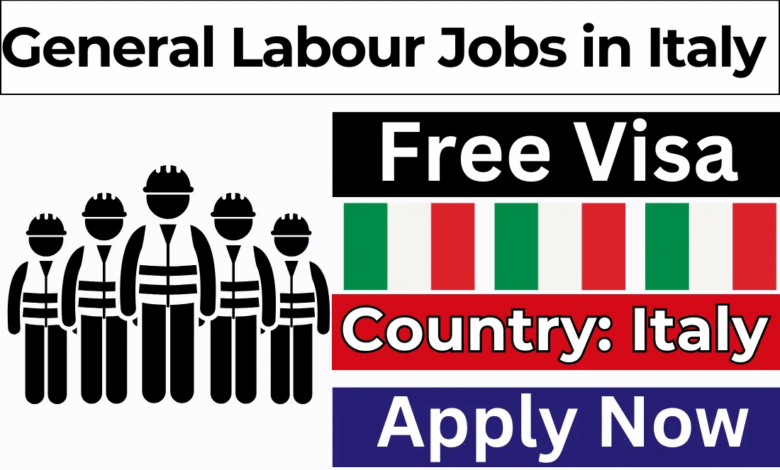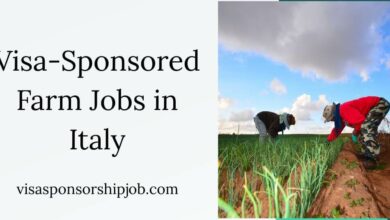How to Apply for Fruit and Vegetable Picker Jobs in Italy from Africa

Agricultural work in Italy, especially fruit and vegetable picking, offers seasonal employment opportunities for foreign workers, including many from Africa. These jobs are not only in high demand during harvesting seasons but also provide a legal pathway for migrants to earn an income and potentially gain residency if they meet certain conditions.
In this article, we’ll explain how Africans can apply for fruit and vegetable picker jobs in Italy, what documents are required, and key tips for increasing your chances of success.
1. Understanding Seasonal Agricultural Work in Italy
Italy’s agricultural sector, especially in regions like Sicily, Puglia, Calabria, and Emilia-Romagna, depends heavily on seasonal workers for harvesting crops like tomatoes, grapes, olives, and citrus fruits. These jobs are physically demanding but offer a legitimate way for foreigners to work temporarily in Italy.
Each year, the Italian government issues a “Decreto Flussi” (Flow Decree), which outlines the number of non-EU seasonal workers allowed to enter the country for specific work sectors, including agriculture.
2. Key Requirements for African Applicants
To apply for seasonal agricultural work in Italy from an African country, here are the main requirements:
a. Job Offer from an Italian Employer
You must have a formal job offer from an Italian employer or farm. This is typically secured before you apply for a visa.
b. Work Visa (Nulla Osta and Seasonal Visa)
You’ll need to apply for a seasonal work visa. Here’s a brief outline of the visa process:
-
Employer Applies for Nulla Osta: The Italian employer submits an application on your behalf to the immigration office in Italy for a work authorization called “Nulla Osta al lavoro stagionale.”
-
Visa Application: Once the Nulla Osta is approved, you can apply for a seasonal work visa (visto per lavoro stagionale) at the Italian embassy or consulate in your country.
-
Residence Permit: Upon arrival in Italy, you must apply for a residence permit for seasonal work (permesso di soggiorno per lavoro stagionale), valid for up to 6 months (sometimes 9 months).
3. How to Find a Job as a Picker from Africa
Finding a legitimate job offer is often the hardest step. Here are some practical ways to do it:
a. Use Certified Job Portals and Recruitment Agencies
-
EURES (European Job Mobility Portal) – Offers job postings from European employers, including agriculture roles in Italy.
-
Agrijob (by Coldiretti) – An Italian platform connecting farmers with seasonal workers.
-
Seasonalwork.it – A platform dedicated to farm jobs across Italy.
b. Apply Through Legal Bilateral Agreements
Some African countries have bilateral agreements with Italy to send seasonal workers legally. Examples include Morocco, Tunisia, Egypt, and Senegal. If you’re from one of these countries, you may apply through your Ministry of Labor or national employment agency when Italy opens up quotas under the Decreto Flussi.
c. Network with Diaspora or Italian Employers
Join Facebook groups, WhatsApp groups, or associations of African workers already in Italy. They can sometimes help connect you with employers or offer advice.
4. Documents You’ll Need
To apply successfully, prepare the following documents:
-
Valid passport (with at least 6 months remaining)
-
Job offer letter or contract from an Italian employer
-
Nulla Osta (work authorization) issued by the Italian immigration office
-
Proof of accommodation in Italy
-
Return flight reservation or intent to return after contract
-
Health insurance (if required)
-
Visa application form and two passport photos
-
Visa application fee (usually €116)
5. When to Apply – Follow the Decreto Flussi Calendar
The Decreto Flussi usually opens between January and April every year. Quotas for seasonal workers can be in the tens of thousands. In 2024, Italy allowed over 80,000 seasonal workers, with a large portion allocated to agriculture.
You must apply quickly once the quota opens. Employers and applicants often struggle with the high demand, so early preparation is key.
6. Challenges to Expect
-
Scams: Be very careful of agents who promise guaranteed jobs or ask for high payments upfront. Always verify with official sources.
-
Language Barrier: Most agricultural employers speak Italian. Basic knowledge of Italian can significantly improve your chances.
-
Exploitation: Unfortunately, some employers exploit foreign workers. Always ensure your contract is registered and legal, and report abuse to local authorities or NGOs if needed.
7. Benefits of Seasonal Work in Italy
-
Legal Income: Earn income in euros and send remittances home.
-
Work Experience: Gain valuable experience in European labor markets.
-
Pathway to Future Opportunities: In some cases, repeat seasonal workers may later qualify for long-term permits or sponsorship.
8. Tips for Success
-
Start early: Monitor the release of the Decreto Flussi.
-
Learn basic Italian: Use free apps like Duolingo or YouTube lessons.
-
Apply only through legal channels: Avoid shortcuts or fake agents.
-
Keep documents ready: A delay can cost you the opportunity.
Applying for a fruit or vegetable picker job in Italy from Africa is possible—but requires preparation, patience, and awareness of the legal steps. Stay informed through your local embassy or Ministry of Labor, and use only verified job portals or licensed recruitment agencies. For thousands of Africans every year, seasonal work in Italy offers a stepping stone to better opportunities and a legal way to travel and earn abroad.
If you’re serious about applying, start researching the next Decreto Flussi and connect with potential employers ahead of time.
Source: Thepressradio.com





